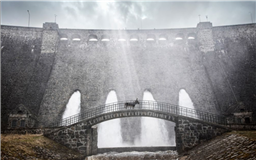It may be impossible for a human to truly imagine the mindset of a donkey, but veteran Polish director Jerzy Skolimowski for the most part does a very engaging job of imagining how a beast of burden sees and senses the world in EO.
Quite clearly conceived as a companion piece and response to Robert Bresson’s profound and deeply moving 1966 study of the same breed of animal in Au Hazard Balthazar, the new film, screening in competition at the Cannes Film Festival, creates an array of dazzling notions as to how such a creature might see the world. Until it somewhat slips off the rails in the final half-hour, this is an exemplary, fresh and radiant piece of work from an 84-year-old director who has not lost his energy or own way of seeing things.
Working in close collaboration with co-screenwriter Ewa Paiskowska and cinematographer Mychal Dymek, Skolimowski uses all manner of visual devices to discern what life looks and feels like to a creature that, unlike many other animals, has no say over the matter. Far more so than for many beasts who live and work in close proximity with humans, theirs is an active and frequently arduous existence, one devoted to considerable drudgery until they simply run out of steam, after which they become essentially useless. Unlike horses, donkeys are not athletes. As it is for many humans, it’s a story of you’re born, you work as long as you can, and then you die.
The story starts in a Polish circus, which doesn’t seem too bad compared to what many beasts face elsewhere. But animal rights activists put a stop to that, whereupon EO lands in a very good spot indeed — a petting zoo; no stress there. Still, nothing seems permanent, a fact that EO must face frequently throughout his itinerant life.
For the better part of an hour, Skolimowski and Dymek show a tremendous ability to imagine and approximate what might be imagined as the beast’s point of view. The film dazzles in its lustrous and witty projection of a sharper way of seeing than what we’re used to; the whole world looks more scintillating, inviting and exciting when experienced through the filmmakers’ heightened visual awareness.
Everywhere EO goes, he’s working, doing a job; that’s what donkeys are for. Without ever approaching boredom or tedium, the film still manages to convey the seemingly endless repetition involved in what the animals do, which in this instance isn’t all that far off from how repetitious and banal the humans’ activities mostly are.
The film’s imagination and visual brilliance initially engage and impress, after which there’s a degree of falling off during a visit with a wealthy woman (Isabelle Huppert) who proves rather uninteresting. This final stretch also has to deal with what happens when such animals arrive at what in humans would be called retirement age; poodles and nice fat kitty cats might still be allowed to live their lives to the natural end of their days, but beasts of burden? Not so likely.
EO is an unexpected work, albeit one that does fit in with current concern for improved treatment of animals, a topic that has gained currency of late. That said, this is not a tract but, rather, a witty, impassioned, and at moments, feverish attempt to imagine the mindset and life of so different a living being.
Must Read Stories
Rithy Panh On Jury Exit; French Gov On Oligarchs; James Gray’s Emotional Speech; Reviews
‘Riverdale’ Set To End; Fall Schedule; ‘Babylon 5’; Pedowitz On “Shock” Of Cancellations
Starz Preps Ava DuVernay Drama Series Starring EPs Lauren Ridloff & Joshua Jackson
Ellen Barkin Testifies Depp Was “Controlling” & “Always Drinking”
Read More About:
Source: Read Full Article




